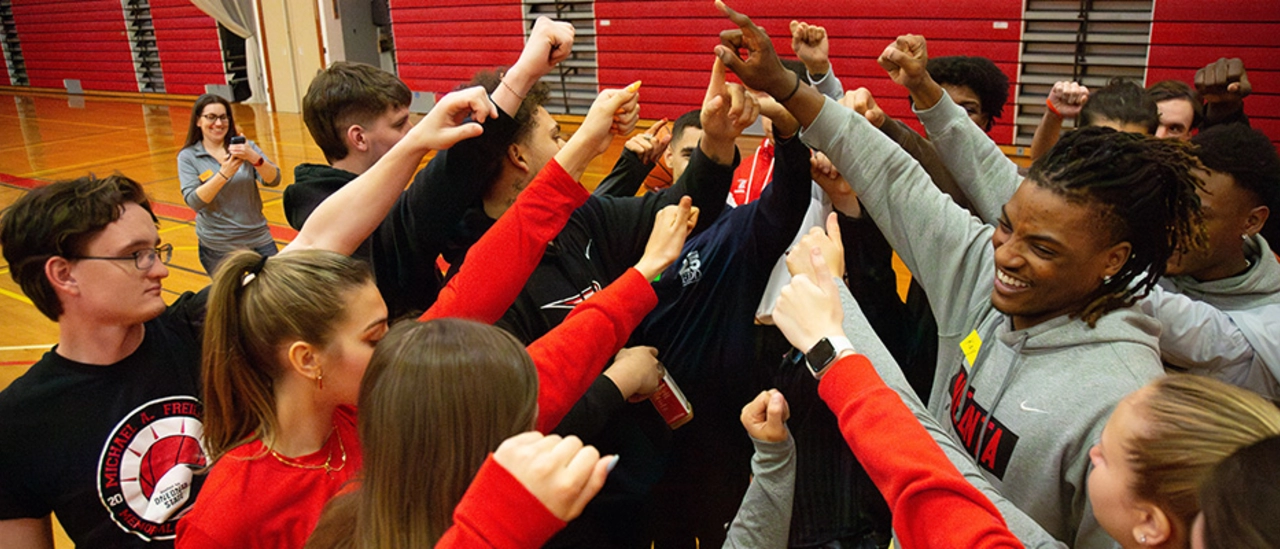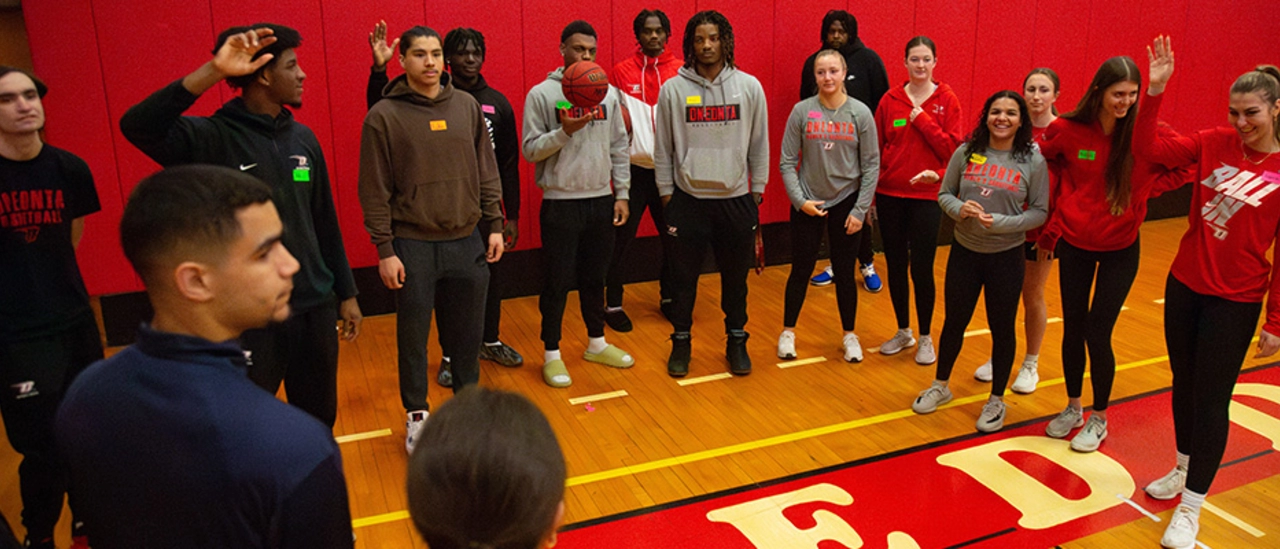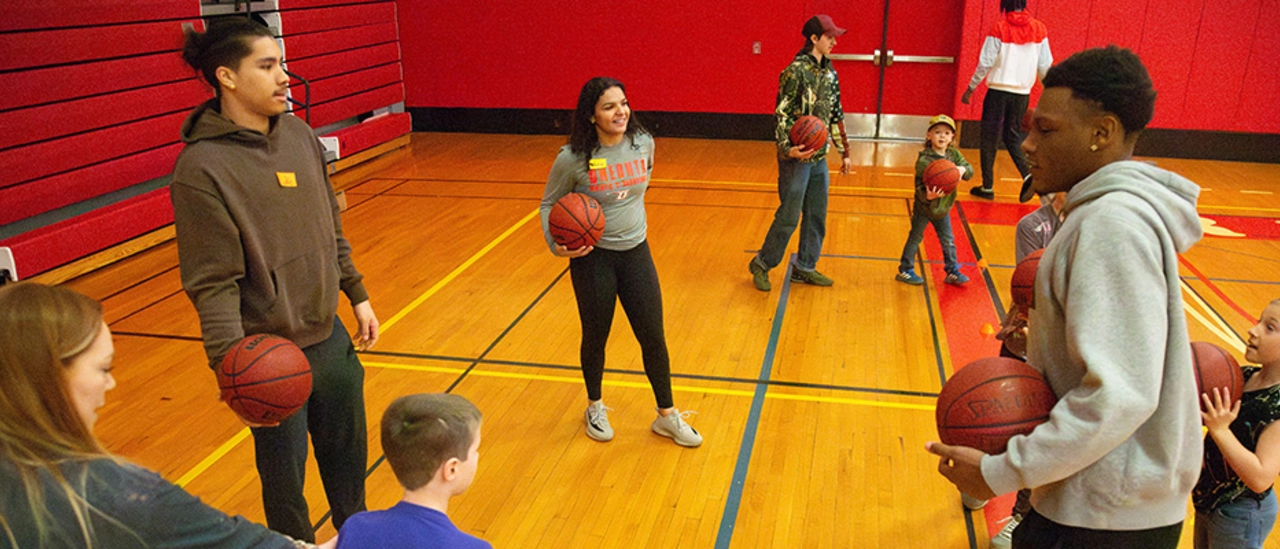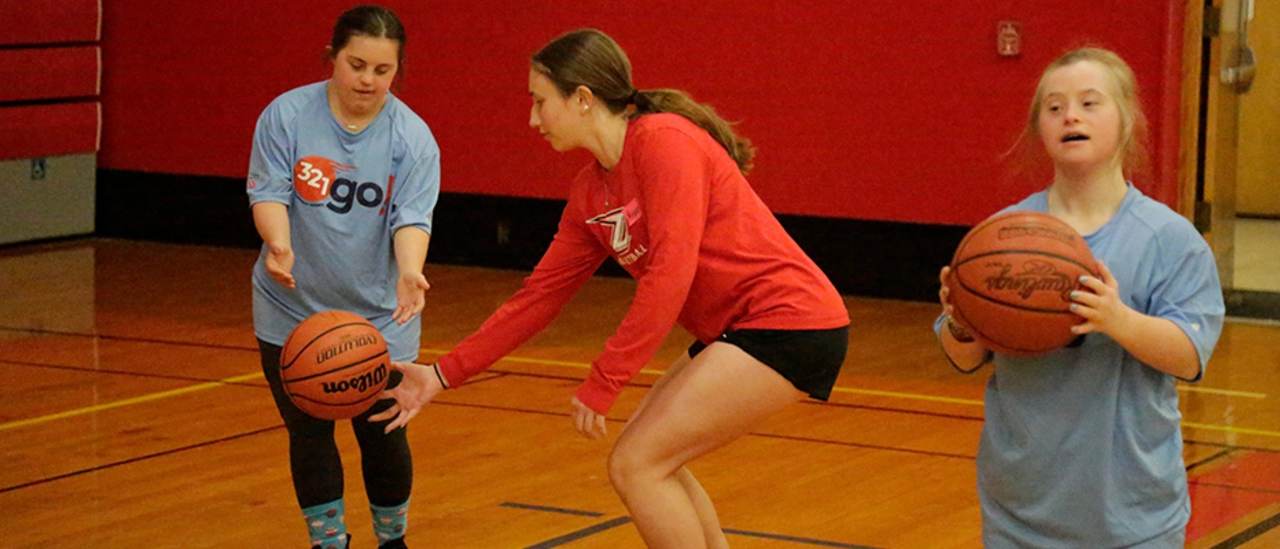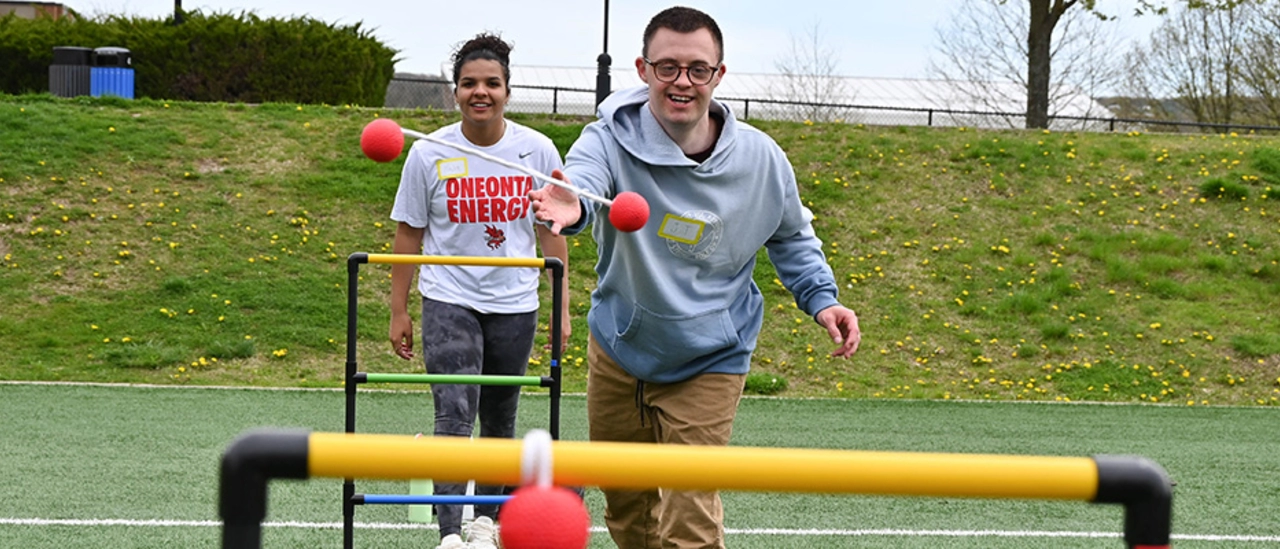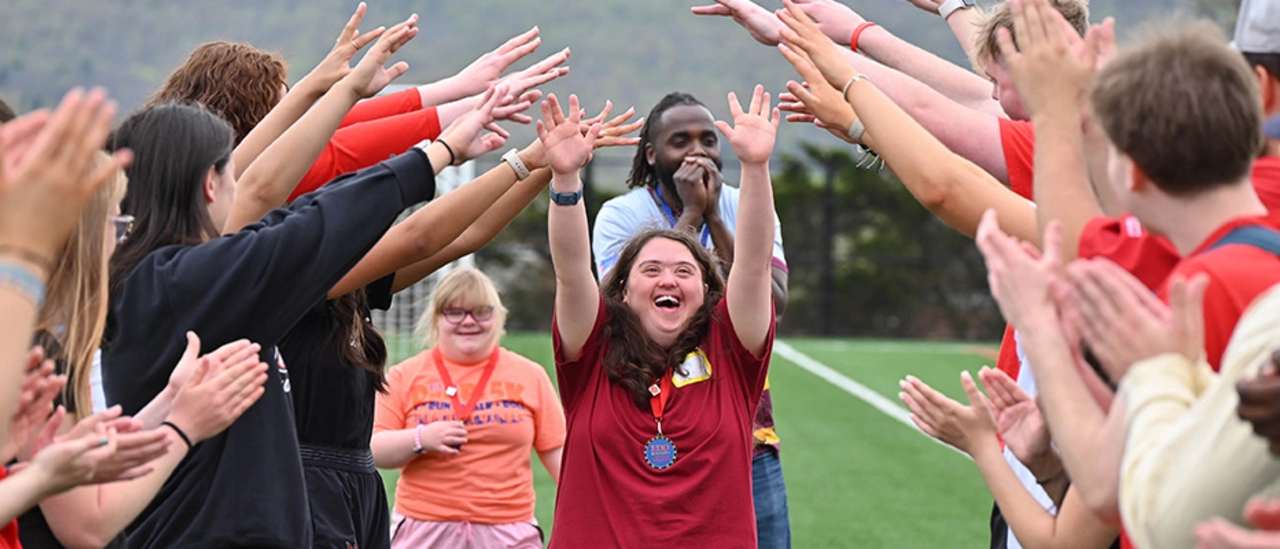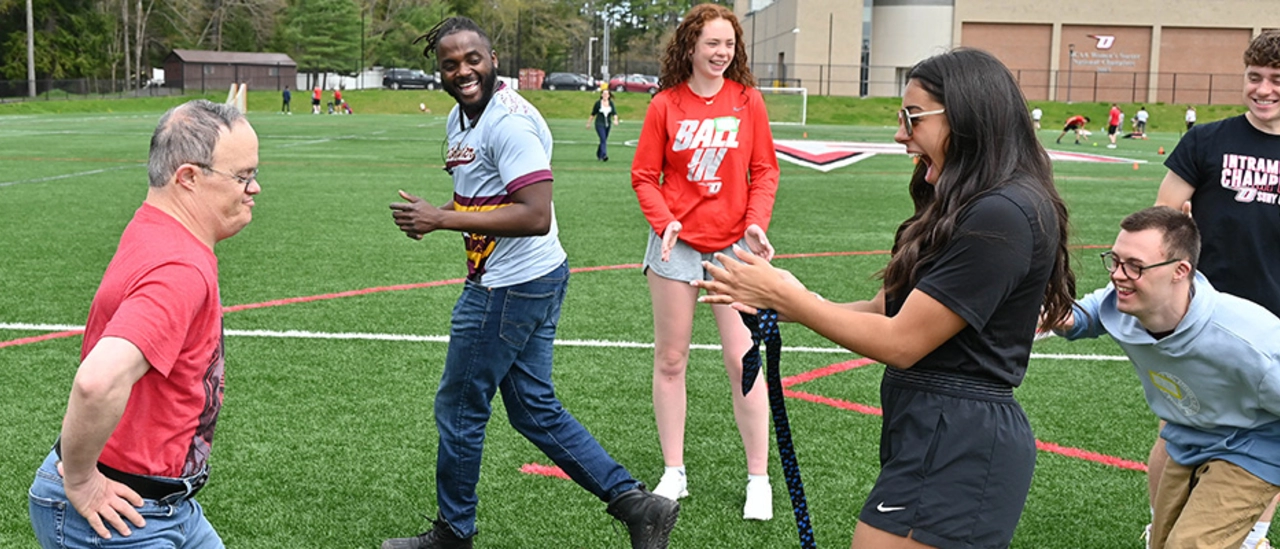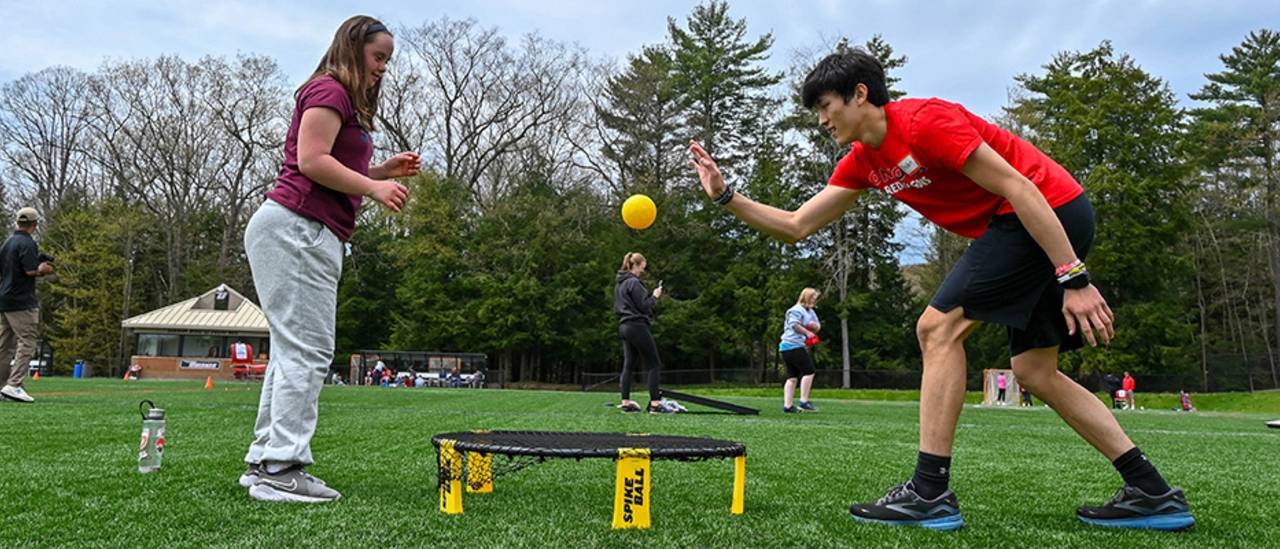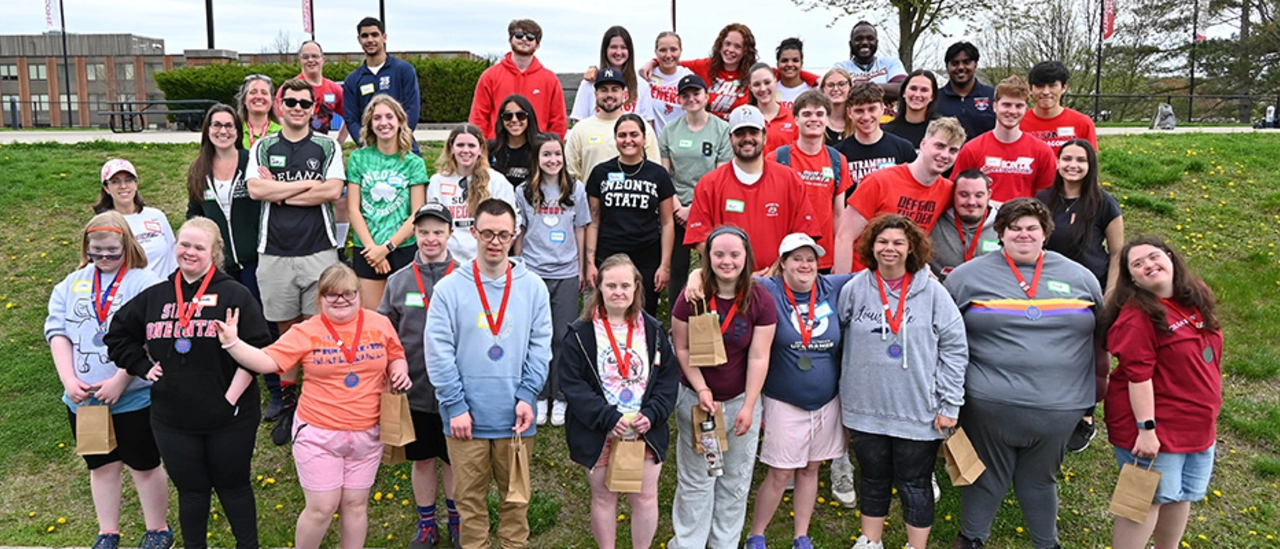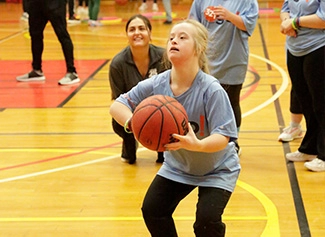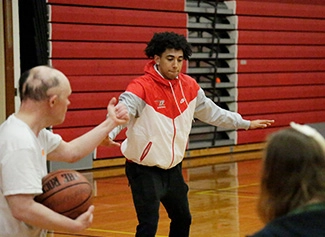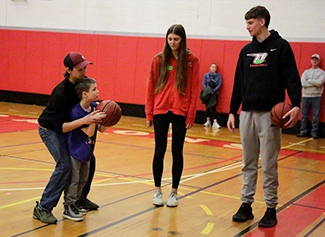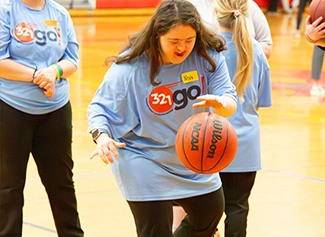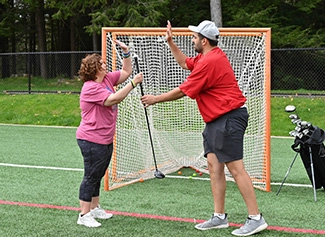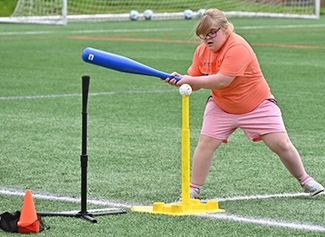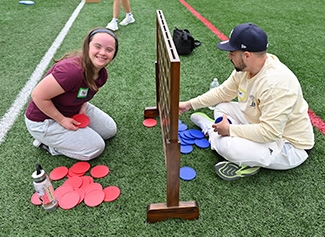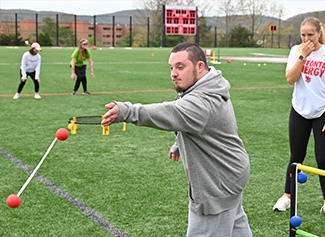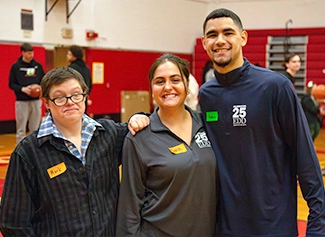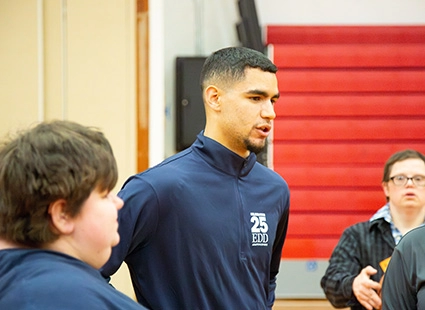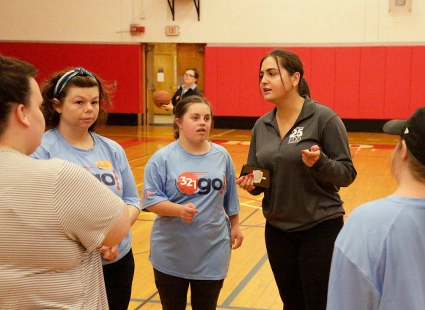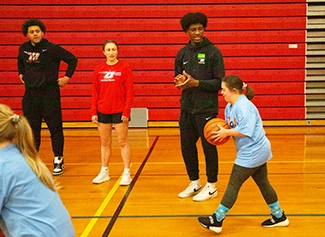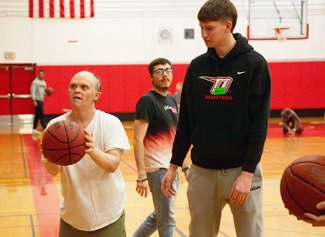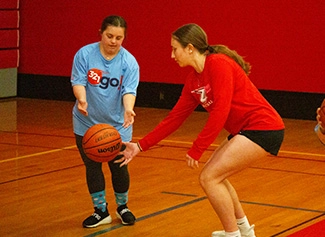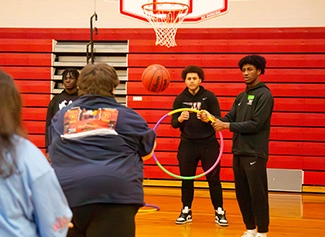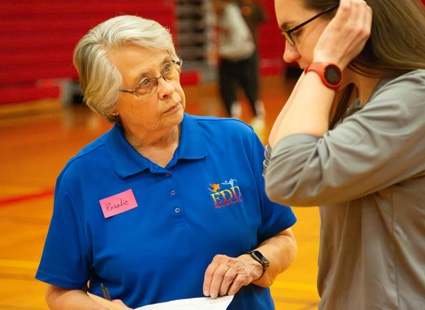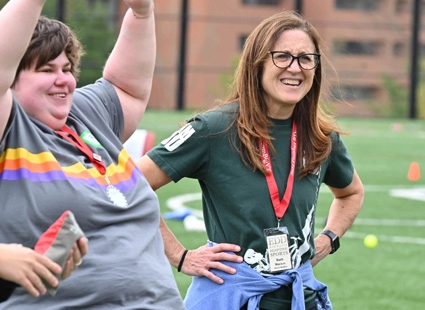Thirty-eight SUNY Oneonta student volunteers and Sport and Exercise Sciences faculty partnered with EDD Adaptive Sports to host two adaptive sports events on campus this spring.
Over the past few years, SUNY Oneonta’s Sport and Exercise Sciences department has developed a relationship with EDD Adaptive Sports, a non-profit organization that offers adaptive sports programs to children and adults with any disability. EDD Adaptive Sports’ programs allow people of all ages to participate in a variety of free athletic and sport-related activities, including basketball, biking, kayaking, soccer, swimming, pickleball, rowing and yoga.
SUNY Oneonta students volunteered at the annual Adaptive Basketball Clinic and the first Adaptive Field Day on campus. The basketball clinic was held in the Chase Gym on April 14 and the field day took place May 4 in the Alumni Field House and Red Dragon Field. Both events allowed area residents who have varying intellectual and adaptive disabilities, including people from local organizations Springbrook and Pathfinder Village, to participate in a variety of athletic activities.
“It's been a really great partnership so far,” said Gretchen Owens, executive director at EDD Adaptive Sports. “I appreciate the ideas the Sport and Exercise Sciences department brought to us for things to do and ways to expand what we offer. By building this partnership with SUNY Oneonta, we're building what we can offer our athletes and getting them more engaged in the community and everything SUNY Oneonta and the greater community has to offer.”
Empowering Adaptive Volunteers
Among the student volunteers were Exercise Science seniors Graham Wooden and Sarah Faulisi, who provided training to the other student volunteers on how to interact and work with the EDD participants. Faulisi and Wooden received a Student Research and Creative Activity (SRCA) grant funded by the SUNY Oneonta Foundation and SUNY Oneonta Alumni Association for their project to develop a national online training program on educating volunteers working with athletes with disabilities. Wooden and Faulisi presented their project, titled “Empowering Volunteers: Developing a Comprehensive Volunteer Training Program for Adapted Sport Events,” on April 25, during the annual Student Research and Creative Activity showcase on campus.
“I’ve been working with individuals with cognitive and physical disabilities since high school,” said Faulisi, who expressed the importance of educating volunteers and making sure they adopted an adaptive mindset. “There’s just this stigma. If you tell someone that they can’t do something or they think they’re not able to do something, they’re never going to try it.”
The primary goal of Faulisi and Wooden’s research is to “create a robust training curriculum that equips volunteers with the knowledge, skill and abilities necessary to support adapted athletes effectively.” Their trainings take roughly 20 minutes to complete, and the primary goal is to ensure every volunteer provides the most adaptable and inclusive environment possible.
“Research has shown that often people have big hearts when it comes to supporting athletes with disabilities, but don’t always have the proper training to provide developmentally appropriate coaching strategies,” said Dr. Katherine Griffes, assistant professor of Sport and Exercise Sciences and the faculty sponsor for Faulisi and Wooden’s SRCA project. “Sarah and Graham have provided this training for all student volunteers and will be turning this training into online modules to make them more accessible for other groups who work with adapted athletes.”
Wooden and Faulisi will present the curriculum and training modules alongside Dr. Griffes at the New York State Association for Health, Physical Education, Recreation and Dance (NYS AHPERD) conference in November 2024 in Verona, NY. Hosted annually for K-12, collegiate health and physical education professionals, the conference includes speakers, research and teaching strategies to increase effectiveness in the health and physical education professions. By presenting at NYS AHPERD, Faulisi, Wooden and Dr. Griffes hope that other schools and organizations can use their ideas to increase the number of well-educated volunteers in their programs.
“My favorite part is just providing the opportunity,” said Wooden. “Inclusivity, I think, is something that is imperative: providing opportunities for every population. That’s always my priority. It’s very fulfilling to see the smiles on every athlete’s face. They always have something that they can take from this experience.”
Joy In Sport
Including Wooden, 18 student volunteers at the Adaptive Basketball Clinic were from the SUNY Oneonta men’s and women’s basketball teams. The basketball teams picked the drills they wanted to teach to EDD’s athletes, resulting in a rotation through four stations focused on dribbling, shooting, passing and defense. With participant ages ranging from 6 to 60, modified basketball hoops and other equipment allowed every athlete to maximize their performance.
Both Faulisi and Wooden returned as volunteers for the Adaptive Field Day, providing training for new and returning volunteers from the SUNY Oneonta basketball, soccer, club rugby, swim and softball teams, students from the Terpsichorean dance club and students from Dr. Griffes’s Ethical Considerations in Exercise Science course. The day’s activities included ladder toss, Spikeball, yoga, cornhole, soccer, wiffle ball and golf with Sport Management senior Nicholas Odell, who will be interning with the PGA Tour this summer.
“The enthusiasm of the coaches helped make the events a wonderful experience,” said Barbara Mackey, a member of the board of directors at EDD Adaptive Sports. “If you looked around, you couldn’t spot a single face without a smile. And if there’s one thing that we want the students to take away from today, it’s a greater level of compassion, empathy and understanding.”
The basketball clinic concluded its second annual event with EDD Adaptive Sports President Rosalie Higgins and Board Director Mackey announcing the awards each athlete won. Mackey and Executive Director Owens announced the Adaptive Field Day awards. Both events’ award ceremonies finished with athletes running through a tunnel of encouraging arms created by the student volunteers, reaching Wooden and Faulisi at the end for a fist-bump, hive-five or hug.
“I hope that they can take away recognizing the value of just the intrinsic joy of being an athlete, of playing a sport, and can see the importance that they play in the world around them,” said Dr. Griffes of the student volunteers. “I hope they feel a sense of empowerment, that they can do something, that they can make a difference in the world and that their ideas matter.”
